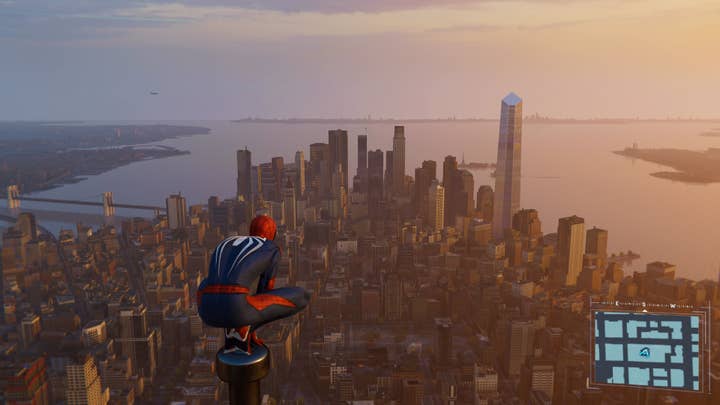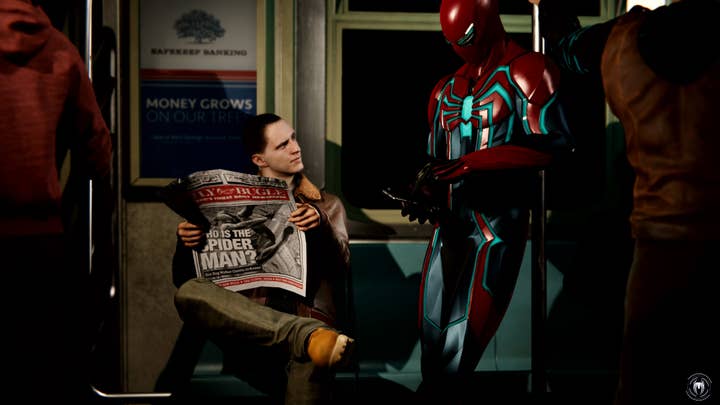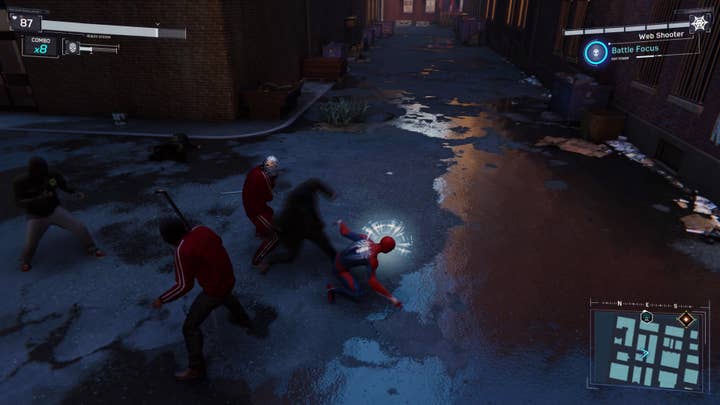Marvel's Spider-Man: Critical Consensus
Insomniac's latest has reviewers applauding top-notch traversal, creative combat, scintillating story
Amazing. Spectacular. Superior. Sensational. In the comics, Spider-Man has worn all these adjectives at one time or another, and they're exactly the sort of descriptors that have welcomed the wall-crawler's latest venture into video games. The review embargo for Marvel's Spider-Man lifted today, and Insomniac's PlayStation 4 exclusive is receiving more applause from the press than its protagonist will ever see from The Daily Bugle.
Many reviewers highlighted the participation of Insomniac, which made a name for itself with the endearing characters and entertaining arsenal of Ratchet and Clank, and more added top-notch traversal mechanics to the list of "things the studio is known for" with the early Xbox One exclusive Sunset Overdrive. All of those attributes are present in abundance, according to Eurogamer's Christian Donlan in his Recommended review.
"The box and the start screen may say Marvel's Spider-Man, and there's all the fan-service you could ask for," Donlan said. "But in truth it's Insomniac's Spider-Man. That's the key to this one, I think: it's a near-perfect marriage of developer and intellectual property (ugh)."

USgamer's Mike Williams echoed that sentiment in his 4.5 out of 5 review.
"Insomniac Games takes Marvel's most popular character for a spin and the results are fantastic," Williams said. "The developer establishes its own Spider-Man with a unique supporting cast and a beautiful recreation of New York to play around in. This is an absolutely beautiful game, with solid combat and a great story. Most of all, it really sells the feeling of being Spider-Man. The gaming history of Spider-Man has been uneven, but this is an amazing entry in that history. Pun intended."
Much of what Williams loved about the game began with its environment, an open-world Manhattan packed with landmarks and buzzing with civilians that will interact with the player, posing for selfies, giving high-fives and the like.
"This lively version of the city is one of the things that puts Insomniac's Spider-Man above some of the previous gems in the series," Williams said. "Treyarch's Spider-Man 2 and Ultimate Spider-Man had traffic and citizens, but were limited by the technology of that era, while Spider-Man: Web of Shadows took place in a city under invasion. There's definitely more of a sense of what Spider-Man is fighting for, even when you're just leisurely swinging across a city block."
Even though the game has a fast travel option (Spider-Man can use the subway, much to the surprise of his fellow travellers), Williams said he preferred to take the long way. In a 9.5 out of 10 review for Game Informer, Andrew Reiner said he never once used it, preferring to immerse himself in Insomniac's city using J. Jonah Jameson's podcast about the dangers of superheroes as a soundtrack to the city.

That might lead players to discover more of the game's side quests and gather resources that can be used to upgrade gadgets and earn new costumes, but it also perhaps shines a light on one of the game's shortcomings.
"The open world is filled with activities, though some fall victim to extensive repetition," Reiner said. "Performing the same button taps to stop a speeding car grows old quickly, as does catching pigeons. The Taskmaster challenges are a good test of skill, and I love the breeziness of Black Cat's Where's Waldo-style photo missions. The city activities and Osborn missions are the weakest of the lot. Combat arenas, of which there are many types, are leaned on too much, especially in the final act."
While Spider-Man's city and web-swinging drew frequent comparisons to the 2004 Spider-Man 2, reviewers often assessed its combat mechanics in relation to Rocksteady's Batman Arkham series of games.
"Visually, yes, Spider-Man bounces from foe-to-foe like Batman, but it's not really the same," Williams said. "Arkham is based heavily around countering and ground takedowns; Batman himself is a beefy, hulking figure that works primarily on brawn. Even closer analogs from the Arkham games like Catwoman and Nightwing are still based around countering. In practice, this game is actually closer to older Spider-Man games, not the Arkham titles."
Williams said the dodging/countering playstyle approach of Arkham works initially in Spider-Man, but added that the combat really starts to click once players embrace the assortment of gadgets Spider-Man has at his disposal. In IGN's 8.7 out of 10 review, Jonathan Dornbush reported having much the same revelation.
"At first, I found myself pretty much just punching and dodging, occasionally webbing up a foe so I could focus on a more powerful baddie," Dornbush said. "But as I unlocked more skills from Spider-Man's skill trees and gadgets, combat became an improvisational delight."
Still, that delight had its limits.

"The fourth or fifth time you figure out how to take on a horde of enemies committing a crime or fend off waves of enemies at an outpost is still entertaining," Dornbush said, adding, "the fortieth is much less so."
But perhaps the most universally praised part of the package was the story, which reviewers were also universally reluctant to go into in much detail given limitations from Sony and Insomniac.
"Insomniac Games' Spider-Man is a triumph of superheroes and storytelling," Reiner said. "Within a beautifully realized version of New York City, Spider-Man soars across the skyline with awe-inspiring grace, ducking into darkened alleys to pummel criminals in spectacular ways... The story has a soul, and isn't afraid to slow down after a hard-hitting fight to show players Peter is every bit as interesting as his alter ego. Almost every move Spider-Man makes is worthy of a highlight reel, but some of the most notable moments are seen through the eyes of Mary Jane Watson, Peter, and other characters."
Or as Donlan put it, "They take a game that is filled with borrowings and genre conventions and the usual suspect, and they give it a vital sense of real character. This open-world superhero game often feels different to all of the others, then. Not because of the things you do, because these are the things you always do, but because of the reasons you often have for doing them - for the life and character and charm that emerges from the context."
He added, "It's a reminder, then, that while it seems that games of a certain type - and a certain budget - are all converging these days, that all games are in a hurry to become the same game with the same tricks and the same hooks, there are still places, even within the most risk-averse of designs, for genuine character to bloom."
